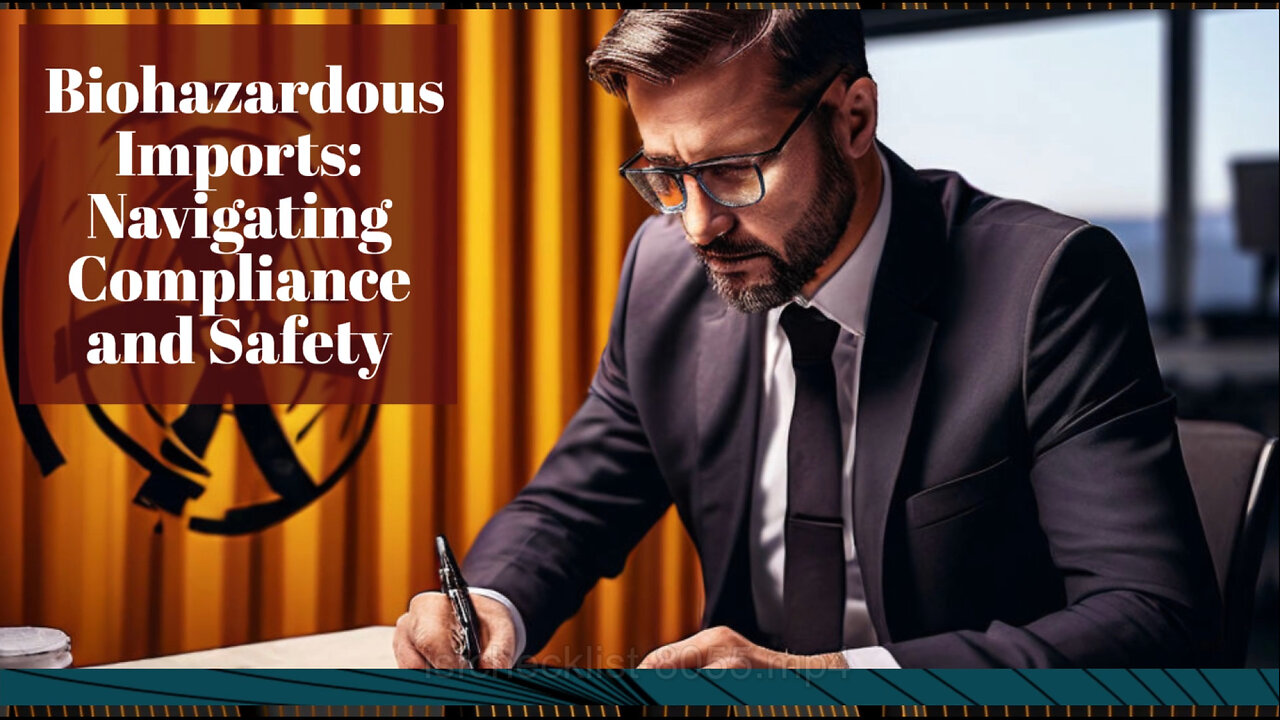Premium Only Content

Biosafety Demystified: Importing Goods with Biohazardous Materials
ISF Checklist || 805-970-7918 || contact@isfchecklist.com || www.isfchecklist.com
When importing goods with biohazardous materials, it is crucial to follow regulations and procedures to ensure safety and compliance. One of the key requirements is to have a customs bond in place, which acts as financial security for both the importer and the Customs and Border Protection (CBP). Importers must work with a licensed customs broker to obtain a customs bond and navigate the complex customs procedures. In addition to the customs bond, importers must also file an Importer Security Filing (ISF), providing detailed information about the shipment to CBP before the goods arrive at the port of entry. Failure to file the ISF accurately and on time can result in penalties or shipment delays. Importers of goods with biohazardous materials may also need to comply with additional regulations from agencies like the FDA or EPA. Overall, working with a licensed customs broker is crucial to ensure safety, compliance, and the protection of public health when importing goods with biohazardous materials.
#usimportbond #isfcustomsbroker #uscustomsclearing #isfentry
Video Disclaimer Here: This video is purely educational and has no ties with the US government.
00:26 - Importing goods with biohazardous materials requires strict compliance with safety regulations and procedures to ensure safety.
00:44 - Obtaining a customs bond is crucial to guarantee payment of duties, taxes, and penalties associated with the importation process.
01:05 - Importers must work with a licensed customs broker to navigate complex customs procedures and ensure accurate and timely submission of documentation.
02:32 - Compliance with additional regulations from agencies like the FDA or EPA is necessary to ensure safe handling and transportation of biohazardous materials.
-
 10:34:09
10:34:09
Rallied
15 hours ago $19.95 earnedSolo Challenges ALL DAY
263K9 -
 1:39:43
1:39:43
Brandon Gentile
2 days agoTOP Money Expert: Bitcoin Will Keep Setting All-Time Highs Beyond $10m
17.2K1 -
 2:02:28
2:02:28
Badlands Media
1 day agoDevolution Power Hour Ep. 385: Trump “Death” Hoax, Supreme Court Tariffs Fight, and Tech-Military Ops
71.2K32 -
 1:56:48
1:56:48
Tundra Tactical
9 hours ago $15.33 earnedFull Semi-Auto Comedy Hour
39.5K3 -
 1:55:52
1:55:52
BlackDiamondGunsandGear
1 day agoGlocks Want Gun Control? // Trump Tramples on your Rights? // After Hours Armory
33.5K4 -
 1:55:52
1:55:52
DLDAfterDark
13 hours ago $5.54 earnedDLD Live! Trump - Flag Burning - Glock & Gun Control - Martial Law Light?? - After Hours Armory
27.1K4 -
 13:46:18
13:46:18
GritsGG
20 hours agoRumble Customs! 3515 Ws! 🫡!
96.2K -
 5:59:47
5:59:47
SpartakusLIVE
15 hours agoThe HUGEST Brain (not forehead) delivers Saturday SPARTOONS || Variety Later - Shadow of Mordor
199K4 -
 2:34:20
2:34:20
Barry Cunningham
16 hours agoPRESIDENT TRUMP WELCOMES FOOTBALL SEASON! AND MORE BREAKING NEWS!
91.7K56 -
 54:47
54:47
Side Scrollers Podcast
19 hours agoSide Scroller Presents KING OF THE KART | MASSIVE MARIO KART TOURNAMENT
53.5K1